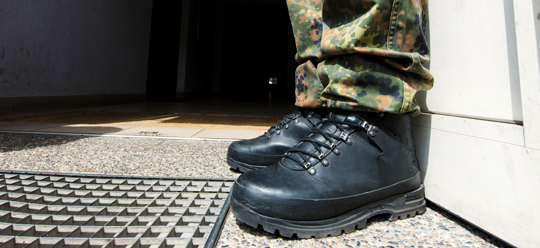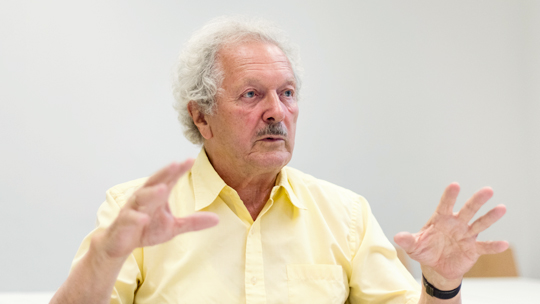Justice, Freedom, Preserving Peace
Freiburg, Jun 12, 2017
German soldiers are showing an increased interest in the army of the Third Reich, the Wehrmacht, as a role model. These are the findings of Prof. Dr. Wolfram Wette, a historian. His research concentrates on the political role of the German armed forces from the time of Imperial Germany to the present day. Verena Adt spoke with the long-time employee of the Military History Research Office in Freiburg and professor in the University of Freiburg's Department of History.

Does the Bundeswehr work differently from civilian society? Wolfram Wette sees an unbridgeable structural breach between the system of orders and obedience on the one hand and democratic rules of engagement and peaceful conflict resolution on the other. Photo: Patrick Seeger
Herr Wette, is the case of the apparently rightist extremist Bundeswehr soldier and terrorism suspect Franco A. an isolated one?
Wolfram Wette: There have been extreme, radical rightist incidents in the Bundeswehr again and again throughout its history. Generally speaking, the responsible ministers always played them down by pointing out they were isolated cases. Apparently no one has ever openly questioned if it is really a matter of isolated cases, or if the internal workings of the Bundeswehr are generally different from civil society.
Are the internal workings of the Bundeswehr different from the rest of German society?
People who join the Bundeswehr are those who can easily subordinate themselves to a system based on orders and obedience, need strong leadership for their own stability, have an affinity for weapons, can imagine shooting and killing, and for whom violence is nothing out of the ordinary. When we imagine civilians, democratic citizens, we see just the opposite. They learn from childhood on to resolve conflicts without violence and by using certain rules. Given that, there's an irreconcilable structural difference between civil society, or more specifically, democratic systems, and the military.
What role does abolishing compulsory military service play? Would "citizens in uniform" have prevented the undesirable developments?
That's an old hope that proponents of democracy had already back in the 19th century. They thought that with general conscription they were propping up policymakers and that there could be no more military conflicts because every human being must have the desire to remain alive. If you look at military history, you must see that this was an illusion. What always counts in a military hierarchy is what's ordered from the top down. Getting rid of compulsory military service does not have the significance many ascribe to it.
Has the Bundeswehr turned into a "warrior cult?"
Until 1990, the Bundeswehr stayed in its barracks. Then they were given new missions, including foreign deployments. That shook a few things up. Until then, hierarchy within the ranks played a big role. Then another hierarchy developed, the one based on the number of foreign deployments. The inner leadership that should've made the Bundeswehr more reconcilable with democracy was allowed to be ground down and the soldiers' interest in the Wehrmacht as a role model increased.

27 Bundeswehr facilities bear the names of Wehrmacht officers. Many soldiers are apparently unable to recognize that these people are not worthy of memorializing in tradition, says Wolfram Wette.
Photo: Patrick Seeger
Has the Wehrmacht become socially acceptable within the Bundeswehr?
The soldier that is deployed abroad and has to accept that he will be involved in fighting looks for role models as matter of course. He knows that the Wehrmacht is politically unacceptable because of its crimes, so he divorces these crimes from the soldiers, leaving them to embody, as they say "eternal soldierly values." That's exactly what we're seeing in the controversies about military bases that are still named after Wehrmacht officers – Major General Marseille, Colonel Lent, General Field Marshal Rommel. There we see that the soldiers in a garrison are very attached to these names, as if they can draw strength from them for their own deeds. They are apparently unable to recognize that these people are not worthy of being elevated in tradition.
And what have politicians done to address this?
Since 1982, the "tradition decree" enacted by the defense minister at the time, Hans Apel, and confirmed by all his successors, has truncated the line of continuity from the Wehrmacht to the Bundeswehr. Yet today there are 27 Bundeswehr facilities that still bear the names of Wehrmacht officers.
Aren't the names of the bases a side issue?
No! People like Lent, Marseille or Rommel took part when Nazi Germany attacked all its European neighbors, occupied and exploited them, shot proportions of the civilian population, let millions of prisoners of war perish, and made the Holocaust possible. They cannot be taken out of this context – that they were so good at shooting down other planes, so it's ok to honor them as a flying ace and ignore the rest. Many soldiers have very serious difficulties understanding that this separation is inadmissible and that they have to see the whole context.
Still, the findings about the Wehrmacht are not new.
That's right. The guidelines for policy are based on our research and the work of the Military History Research Office here in Freiburg. Even back in Apel's day, they made it impossible to draw a line of tradition from the Bundeswehr to the Wehrmacht.
Are there any role models in German military history at all?
When we have armed forces in a democracy, then it should be clear that these are for pursuing the goals of justice, freedom and preserving peace. That the purposes of peace, and not war, are viewed as requiring urgency. We can find people in German history who certainly meet this standard. In the Weimar Republic there were a whole series of imperial officers who advocated for the democratic state. As we discovered through our research in the 1990s, they diligently tried to preserve peace and contribute to shaping peace. We published something of a tome on the topic.
Are there role models in the Wehrmacht as well?
During the Nazi period, officers could not advocate for peace openly. But through our research we have found that people who thought this way helped the persecuted and, for example, saved Jews. A major research project developed from these findings about helpers and rescuers in uniform. We certainly have potential names from recent German history that would be far better suited for shaping tradition than these unfortunate names of imperial and Wehrmacht generals.
Want to read more?
Wolfram Wette: Pazifistische Offiziere in Deutschland 1871 bis 1933. (Pacifist Officers in Germany from 1871 to 1933.) With cooperation of Helmut Donat. Bremen 1999.
Wolfram Wette (Hrsg.): Retter in Uniform. Handlungsspielräume im Vernichtungskrieg der Wehrmacht. (Rescuers in Uniform. Scope for Action during the Wehrmacht's War of Annihilation. Preface by Fritz Stern. Frankfurt 2002, 3rd Edition, 2003.

